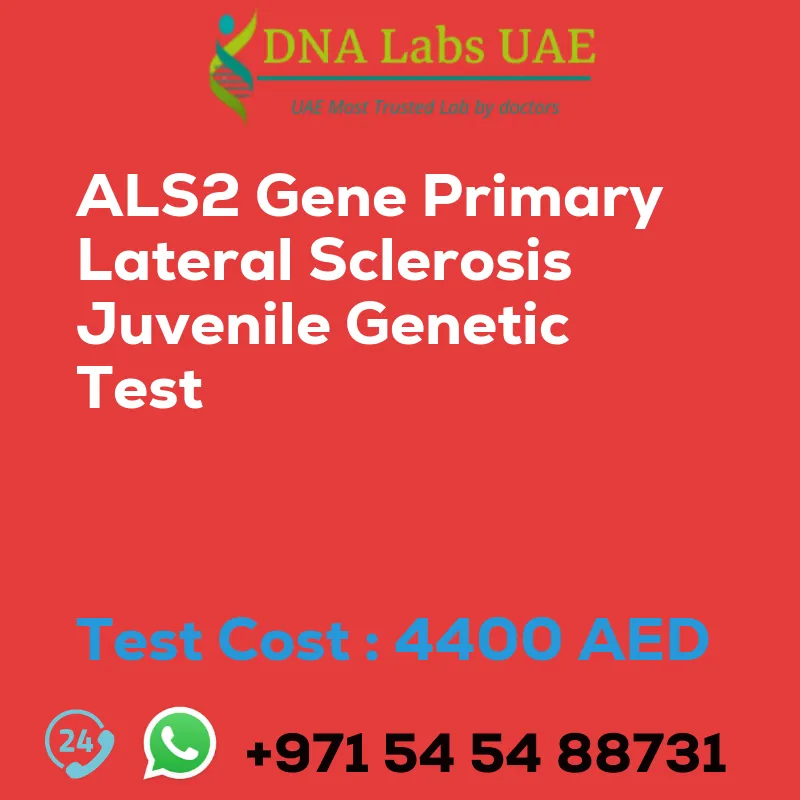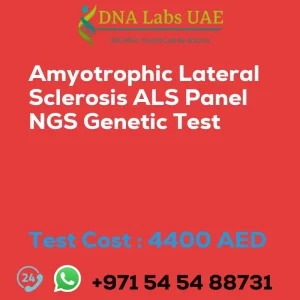ALS2 Gene Primary Lateral Sclerosis Juvenile Genetic Test
Components: Blood or Extracted DNA or One drop Blood on FTA Card
Price: 4400.0 AED
Sample Condition: Blood or Extracted DNA or One drop Blood on FTA Card
Report Delivery: 3 to 4 Weeks
Method: NGS Technology
Test Type: Neurological Disorders
Doctor: Neurologist
Test Department: Genetics
Pre Test Information: Clinical History of Patient who is going for ALS2 Gene Primary Lateral Sclerosis, Juvenile NGS Genetic DNA Test. A Genetic Counselling session to draw a pedigree chart of family members affected with ALS2 Gene Primary Lateral Sclerosis, Juvenile.
Test Details
Primary lateral sclerosis (PLS) is a rare, slowly progressive motor neuron disorder that primarily affects the upper motor neurons in the brain and spinal cord. It is characterized by weakness and stiffness in the voluntary muscles, especially in the legs.
The ALS2 gene is associated with a subtype of PLS called juvenile primary lateral sclerosis (JPLS). Mutations in the ALS2 gene are inherited in an autosomal recessive manner, meaning that an individual must inherit two copies of the mutated gene (one from each parent) to develop the condition.
NGS (Next-Generation Sequencing) genetic testing is a method used to analyze multiple genes simultaneously to identify genetic variations or mutations that may be associated with a particular condition. In the case of ALS2 gene-related PLS, NGS genetic testing can be used to detect mutations in the ALS2 gene that may be responsible for the development of JPLS.
NGS genetic testing for ALS2 gene-related PLS involves obtaining a DNA sample, typically through a blood or saliva sample, and sequencing the DNA to analyze the ALS2 gene. This can help identify any mutations or variations in the gene that may be causing the condition.
The results of NGS genetic testing can provide valuable information for diagnosis, prognosis, and potential treatment options for individuals with ALS2 gene-related PLS. It can also be helpful for genetic counseling and family planning purposes, as it can determine if an individual is a carrier of the ALS2 gene mutation and at risk of passing it on to their children.
It’s important to note that NGS genetic testing is typically performed by specialized laboratories and should be ordered and interpreted by healthcare professionals with expertise in genetics. The testing process, cost, and availability may vary depending on the specific laboratory and country.
| Test Name | ALS2 Gene Primary lateral sclerosis juvenile Genetic Test |
|---|---|
| Components | |
| Price | 4400.0 AED |
| Sample Condition | Blood or Extracted DNA or One drop Blood on FTA Card o |
| Report Delivery | 3 to 4 Weeks |
| Method | NGS Technology |
| Test type | Neurological Disorders |
| Doctor | Neurologist |
| Test Department: | Genetics |
| Pre Test Information | Clinical History of Patient who is going for ALS2 Gene Primary lateral sclerosis, juvenile NGS Genetic DNA Test A Genetic Counselling session to draw a pedigree chart of family members affected with ALS2 Gene Primary lateral sclerosis, juvenile |
| Test Details |
Primary lateral sclerosis (PLS) is a rare, slowly progressive motor neuron disorder that primarily affects the upper motor neurons in the brain and spinal cord. It is characterized by weakness and stiffness in the voluntary muscles, especially in the legs. The ALS2 gene is associated with a subtype of PLS called juvenile primary lateral sclerosis (JPLS). Mutations in the ALS2 gene are inherited in an autosomal recessive manner, meaning that an individual must inherit two copies of the mutated gene (one from each parent) to develop the condition. NGS (Next-Generation Sequencing) genetic testing is a method used to analyze multiple genes simultaneously to identify genetic variations or mutations that may be associated with a particular condition. In the case of ALS2 gene-related PLS, NGS genetic testing can be used to detect mutations in the ALS2 gene that may be responsible for the development of JPLS. NGS genetic testing for ALS2 gene-related PLS involves obtaining a DNA sample, typically through a blood or saliva sample, and sequencing the DNA to analyze the ALS2 gene. This can help identify any mutations or variations in the gene that may be causing the condition. The results of NGS genetic testing can provide valuable information for diagnosis, prognosis, and potential treatment options for individuals with ALS2 gene-related PLS. It can also be helpful for genetic counseling and family planning purposes, as it can determine if an individual is a carrier of the ALS2 gene mutation and at risk of passing it on to their children. It’s important to note that NGS genetic testing is typically performed by specialized laboratories and should be ordered and interpreted by healthcare professionals with expertise in genetics. The testing process, cost, and availability may vary depending on the specific laboratory and country. |








